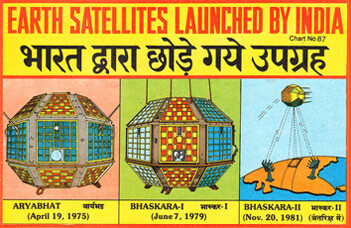The regional political dimensions of President Obama's trip to India remain shrouded in secrecy. There was no obvious signal that the United States managed to exert any pressure on India regarding rapprochement with Pakistan, nor was there a clear sign of how India's role in Afghanistan might be better aligned with U.S. interests.
Perhaps a missing link in all these conversations is science—an underutilized means of diplomacy worldwide, and particularly in South Asia. This is especially ironic since the subcontinent is perhaps the most "geek-friendly" place on Earth! Science and engineering are deeply ingrained in South Asian culture as the primrose path to success.
Unfortunately, the context of science in South Asian relations has been overwhelmed by competitive defense technologies. While art and music groups are frequently allowed to cross borders between India and Pakistan for performances, scientists have a much more difficult time. In 2007, the U.S. National Science Foundation supported a series of collaborative workshops between Pakistani and Indian environmental scientists, but both countries were resistant to grant visas and the organizers were forced to arrange separate domestic meetings and one joint meeting in Kathmandu, Nepal, where neither side needed a visa. Moreover, the goal of collaborative fieldwork still eludes us.
Even though environmental scientists have little interest in nuclear secrets, the perception of scientists as a security risk remains strong on both sides. The United States could and should play a more active role in building trust between India and Pakistan around nonpolitical issues.
Collaboration on climate change science in the glaciated headwaters of the Indus basin river system, especially following the devastating floods of 2010, makes practical and political sense. It is understandable that India will once again be reluctant to accept any "outside interference" on this but the threat of climate change is a global concern and the Karakoram glaciers are a pivotal natural laboratory for understanding these dynamics. Scientists from Pakistan and India have a clear and present interest in collaborating on this matter as part of their obligations to international environmental agreements.
As delegates assemble for climate change negotiations this coming week in Cancun, Mexico, the instrumental use of science for diplomacy presents an opportunity for unexpected gain amid otherwise sluggish talks. Such deliberations could also encompass a dialogue between scientists on how Earth observation and remote sensing can be effectively used to address environmental security challenges in the future. Currently, there are around ten Indian Remote Sensing (IRS) satellites, which are some of the best in the world for generating information on natural resources. Data from the IRS satellites are used for a variety of applications such as drought monitoring, flood risk zone mapping, urban planning, forestry surveys, environmental impact analysis, and coastal studies.
Of course, security concerns accompany any data-sharing agreement. A working group on sharing these resources could very well serve as a starting point for engagement. However, in order to address shared concerns and future challenges in South Asia, meaningful facilitation from a major interlocutor such as the United States would be essential. Sixty years of bilateral conversations between India and Pakistan have shown the utter failure of leaving such matters to the adversaries themselves.
All major territorial dispute settlements in the twentieth century such as the East Timor conflict or the Northern Ireland conflict have involved some external facilitation. Science diplomacy offers the gentlest form of such facilitation. Political capital, beyond state dinners and economic delegations, needs to be expended to move India and Pakistan to accept such assistance.
It is high time that the United States and all interested international players consider novel strategies for securing peace in South Asia. Science and ecology hold great promise as a tool of diplomacy in this region and should be given priority in sustainable conflict resolution.
Saleem H. Ali, a Pakistani-American, is professor of environmental planning at the University of Vermont and a National Geographic Emerging Explorer for 2010. Bharath Gopalaswamy, an Indian-American, is a senior research scholar at Cornell University and a defense analyst for the Stockholm International Peace Research Institute.




